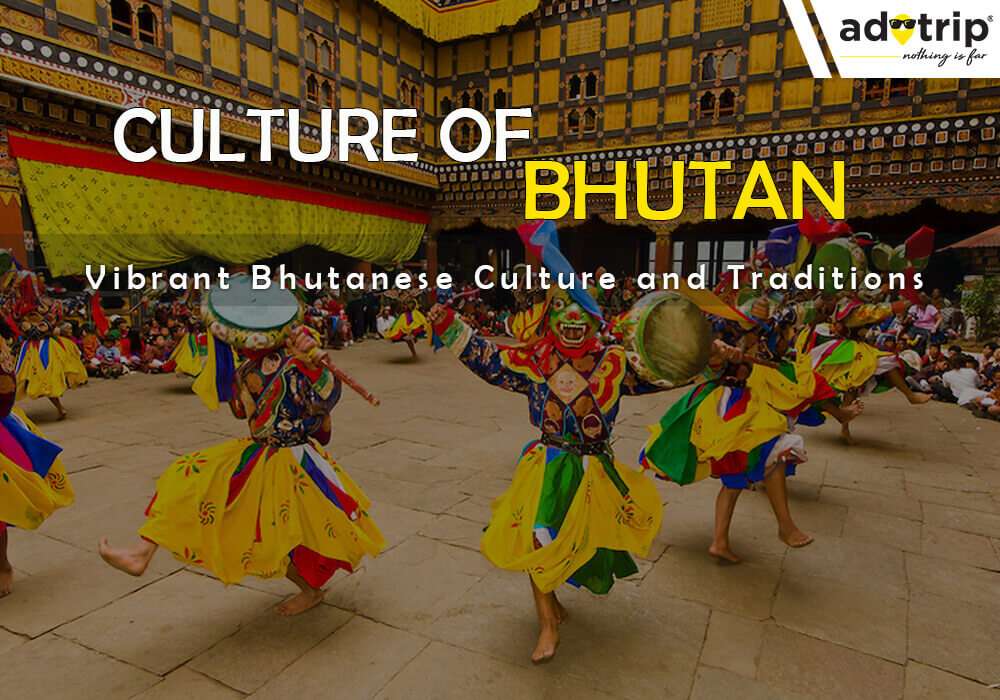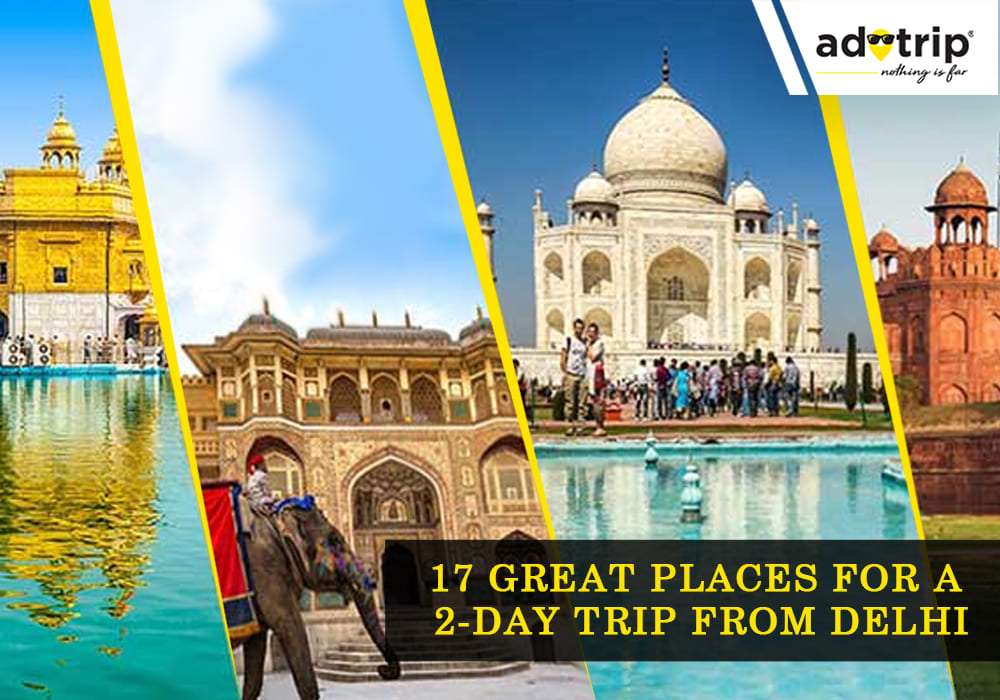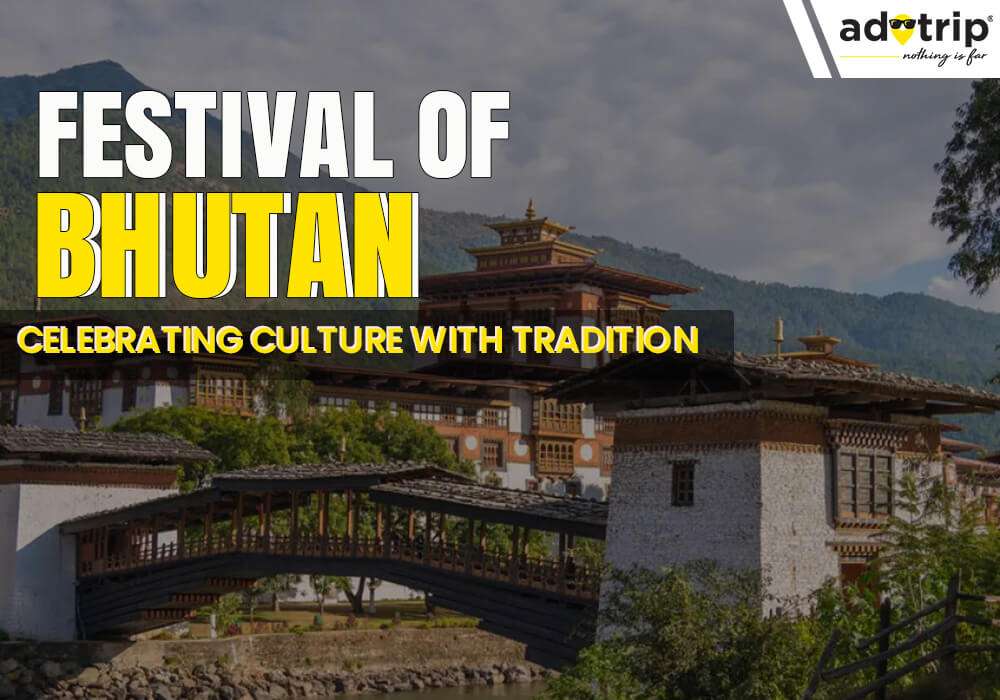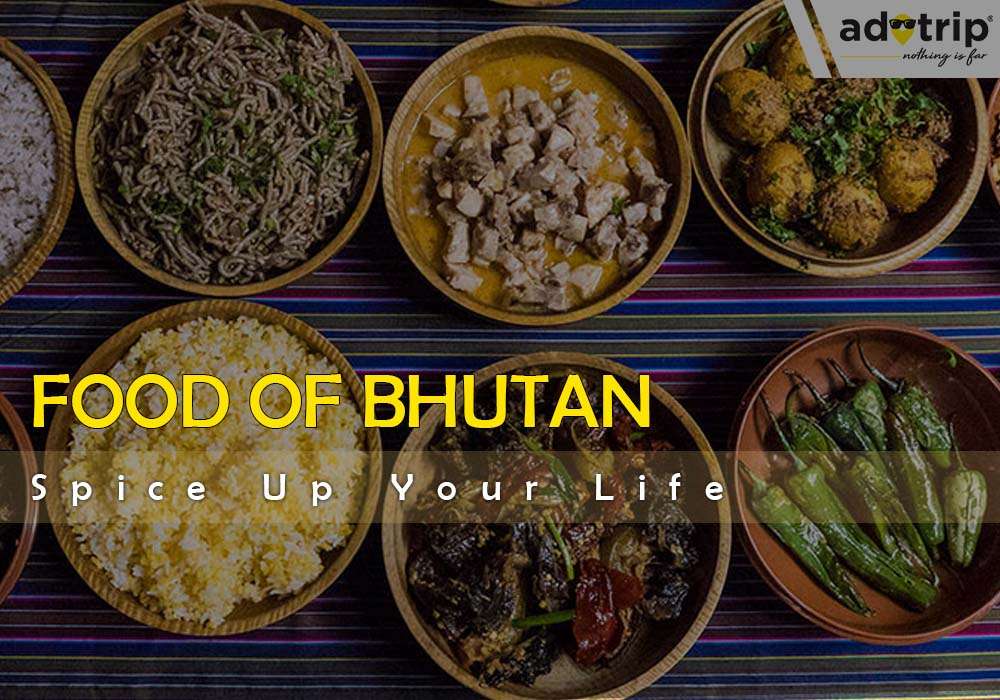
Last Updated At: 27-Sep-2023
Culture of Bhutan : Timeless Cultural Treasures
Bhutan, tucked away in the Eastern Himalayas, has a captivating culture along with its stunning scenery. This tiny nation, often known as the "Land of the Thunder Dragon," possesses a distinctive fusion of tradition and modernity. Buddhism is central to Bhutanese culture, and the country's gorgeous landscapes are dotted with monasteries and temples. The nation's vibrant festivals, including Tshechu, honour this legacy with vibrant dances and ceremonies. Bhutan's dedication to Gross National Happiness shows its priority on maintaining its cultural heritage and the environment. We will learn more about the intricate Bhutan cultural heritage as we dive deeper.
Explore the Cultural Splendours of Bhutan | Timeless and Vibrant
Bhutan's culture is a captivating blend of tradition and spirituality. With deep-rooted customs, colourful festivals, and a strong sense of community, it's a living heritage that cherishes simplicity, happiness, and harmony. Here are some of the different cultures of Bhutan mentioned below:-
- Image of Bhutanese Monastery | A Tranquil Monastery in Bhutan, Tucked up in the Highlands
- Dancers From Bhutan in Traditional Clothing | Tibetan Dancers Dressed in Colourful Traditional Attire
- Bhutanese Prayer Flags | Prayer Flags of Various Colours Flapping in the Bhutanese Wind
- Bhutanese Archery Match | Bhutan National Sport
- Bhutanese Festive Mask | A Lavish Festival Mask Made in Bhutan
- Bhutanese Buddhist Monks | Buddhist Monks From Bhutan Meditating Deeply
- Bhutanese Traditional Food | On a Wooden Table, Delicious Bhutanese Food Was Served
- Bhutanese Family in Traditional Dress | Family in Colourful Attire
- Bhutanese Art and Crafts | Tradition and Craftsmanship
1. Image of Bhutanese Monastery | A Tranquil Monastery in Bhutan, Tucked up in the Highlands
The monastery, tucked away in the gorgeous Bhutanese countryside, symbolises the nation's spiritual heritage. Its elaborate development, embellished with vivid hues and classic motifs, creates a serene ambience. Monasteries in Bhutan serve as both places of religion and cultural preservation. They are essential centres for preserving the country's rich cultural history since they impart knowledge of Bhutanese art, dance, and music. Each monastery has its special charm that blends well with Bhutan's rich cultural heritage.
The monastery, tucked away in the gorgeous Bhutanese countryside, symbolises the nation's spiritual heritage. Its elaborate development, embellished with vivid hues and classic motifs, creates a serene ambience. Monasteries in Bhutan serve as both places of religion and cultural preservation. They are essential centres for preserving the country's rich cultural history since they impart knowledge of Bhutanese art, dance, and music. Each monastery has its special charm that blends well with Bhutan's rich cultural heritage.
2. Dancers From Bhutan in Traditional Clothing
Bhutanese dancers portray their country's culture through their beautiful moves while dressed in stunning traditional costumes. They perform historic dances that reflect legends and tales passed down through the years while dressed in colourful robes, elaborately embroidered costumes, and exquisite masks. These cultural performances offer a fascinating window into Bhutan's lively and rich legacy and serve as a source of national pride.
3. Bhutanese Prayer Flags | Prayer Flags of Various Colours Flapping in the Bhutanese Wind
The landscape is adorned with "lungta," or Bhutanese prayer flags. Their vibrant presence gives the calm image a spiritual touch. These flags, which bear the prayers and blessings of those who hang them, are imprinted with sacred mantras and symbols. It is thought that the prayers are sent up to the skies as they flutter in the Himalayan breeze, bringing peace and harmony with them. These flags represent more than simply Bhutanese culture; they also reflect the country's deeply ingrained spirituality and appreciation for the natural world.
4. Bhutanese Archery Match | Bhutan National Sport
Bhutan's national sport is archery, both a competitive sport and a vivid cultural show. Archers fire at far, little wooden targets as they manoeuvre across stunning scenery. As archers and spectators participate in exuberant celebrations, the mood is electric. This historic sport, which uses traditional bows and arrows, symbolises Bhutan's cultural core by fusing talent, camaraderie, and a strong connection to the nation's past. The heart of Bhutanese culture is displayed in this lively competition.
5. Bhutanese Festive Mask | A Lavish Festival Mask Made in Bhutan
Festive masks from Bhutan are fascinating representations of the nation's rich cultural heritage. Intricately crafted masks like these are a focal point of lively celebrations like Tshechu in Bhutan. Experienced artisans painstakingly create each mask and depict gods, demons, or historical figures. They come to life when worn by dancers during festivals, narrating tales and playing out old legends. These masks are not just works of art but also representations of Bhutan's rich cultural traditions and deeply ingrained spirituality.
6. Bhutanese Buddhist Monks | Buddhist Monks From Bhutan Meditating Deeply
Maroon-robed Buddhist monks from Bhutan physically represent the country's spiritual identity. They live dedicated lives of devotion, prayer, and meditation within tranquil monasteries and temples. Their daily rituals include chanting, prayer flag ceremonies, and serving the community. Bhutanese monks are spiritual guides and curators of cultural heritage, works of art, and philosophical traditions. They add a profound feeling of spirituality to Bhutan's culture with their serene presence against the nation's stunning scenery.
7. Bhutanese Traditional Food | On a Wooden Table, Delicious Bhutanese Food Was Served
The culture and tenacity of Bhutan's people are reflected in its traditional cuisine. Many cuisines are built upon staples, including red rice, buckwheat, and maize. A national favourite of Bhutanese cuisine is the hot cheese and chilli stew known as ema datshi. Meals frequently feature substantial servings of meat and veggies, and momo dumplings are a beloved treat. Bhutan's particular culinary identity is exemplified by the cuisine's strong flavours, which are commonly infused with red and green chillies. This adds a savoury layer to Bhutan's rich culture.
8. Bhutanese Family in Traditional Dress | Family in Colourful Attire
The very core of Bhutan's cultural identity is embodied by a family clothed in colourful traditional garb. While women dress elegantly in "kira," guys have a distinctive "gho." These clothing represent Bhutan's rich heritage and strong ties to tradition because of their elaborate designs and vibrant patterns and fabrics. The Bhutanese traditional clothing conveys the virtues of humility and deference. Each generation passes down the legacy of clothes and morals as the family gathers, creating a stunning image of Bhutan's cultural preservation.
9. Bhutanese Art and Crafts | Tradition and Craftsmanship Merge
Bhutan's skilled craftspeople and dedication to maintaining cultural heritage are exemplified through the country's arts and crafts. A combination of aesthetic skill and spiritual meaning may be seen in the intricately created thangka paintings, wood carvings, and pottery. Buddhist customs heavily influence Bhutanese artistry and frequently use symbols and patterns with deeper meanings. In addition to being creative outlets, these Bhutanese art and crafts forms link Bhutan's vivid past and present, promoting cultural continuity.
Adotrip is your ideal travel partner for an immersive Bhutanese cultural experience. Our meticulously designed itineraries take you beyond the surface, allowing you to delve deep into Bhutan's captivating traditions and vibrant festivals. We handle all the logistics, ensuring seamless travel, while you embrace the warmth of Bhutan's culture. From the mesmerising masked dances of Paro Tsechu to the serene rituals of Thimphu Tshechu, Adotrip unveils Bhutan's soul. Let us be your guide to discover Bhutan's harmonious blend of tradition, spirituality, and happiness. With Adotrip, your Bhutan journey becomes a cultural odyssey filled with unforgettable memories.
With us, nothing is far!
Book Bhutan Tour Packages
Frequently Asked Questions about the Culture of Bhutan
Q1. What is unique about Bhutan's cultural identity?
A1. Bhutan stands out in a world that is changing quickly due to its emphasis on Gross National Happiness, preservation of ancient rituals, rich Buddhist heritage, and dedication to sustainable development.
Q2. How does Bhutan's culture influence daily life and traditions?
A2. Bhutan's culture significantly impacts daily life because of its emphasis on Buddhist principles, traditional dress, holidays, and social customs, which promote a sense of community, spirituality, and cultural continuity among its citizens.
Q3. What role does Buddhism play in Bhutanese culture?
A3. Bhutanese culture is based on Buddhism, influencing festivals, values, and artistic and religious expression. Every aspect of Bhutanese life is influenced by its spirituality, compassion, and profound reverence for nature.
Q4. How do Bhutanese people celebrate important festivals and events?
A4. Bhutanese people lavishly display traditional dances, masked performances, and religious rites at major festivals in Bhutan. Like Tshechu, these occasions strengthen cultural links, unite people, and foster spiritual ties.
Q5. What is the significance of traditional Bhutanese attire?
A5. Ghos and kiras, two examples of traditional Bhutanese clothing, stand for ethnic pride, humility, and respect. It serves as a visual reflection of Bhutan's illustrious history and core values.
Q6. How has modernisation impacted Bhutan's cultural heritage?
A6. Urbanisation and increased access to technology are two changes brought about by modernization in Bhutan that impact lives. However, Bhutan's dedication to sustainable development and cultural preservation helps preserve its distinctive history.
Q7. What are some traditional art forms and crafts of Bhutan?
A7. Here are some of the traditional art forms and crafts of Bhutan includes:-
- Thangka Painting
- Pottery
- Weaving
- Mask Making
- Calligraphy
- Metalwork
- Bamboo Craft
Q8. How do Bhutanese people view the concept of Gross National Happiness?
A8. Bhutanese people place a high importance on the Gross National Happiness (GNH) concept, which prioritises happiness over financial prosperity. It directs policy, focusing on spiritual, cultural, and environmental issues, and promotes happiness and a distinct sense of national identity.
Q9. What are the key cultural etiquettes and customs visitors should be aware of?
A9. Visitors to Bhutan should observe traditions, including wearing their shoes before entering houses and places of worship, dressing modestly, and exhibiting respect for elders and monks. You should always obtain permission before taking photos.
Q10. How is Bhutan working to preserve and promote its cultural heritage?
A10. Bhutan actively promotes and protects its cultural heritage by supporting organisations, educational institutions, and craftspeople. The preservation of ancient architecture and practices is ensured by stringent limitations on modern development and tourism.
--- Published By Adotrip
Latest Blogs

17 Best Places for 2 Days Trip from Delhi

Top 10 Hill Stations Near Bangalore for an Unforgettable Get...

Top 10 Hill Stations Near Chennai For a Perfect Getaway

10 Best Hill Station Getaways Near Gurgaon for Peace Seekers

10 Astonishing Underwater Temples of India You Must Visit in...
Speak to our experts
Popular Flights
Udaipur to Lucknow Flights
Guwahati to Raipur Flights
Nagpur to Delhi Flights
Dehra Dun to Varanasi Flights
Jammu to Mangalore Flights
Vadodara to Vishakhapatnam Flights
Kochi to Vishakhapatnam Flights
Coimbatore to Kochi Flights
Jaipur to Kolkata Flights
Hyderabad to Amritsar Flights






 Dubai
Dubai Malaysia
Malaysia USA
USA






